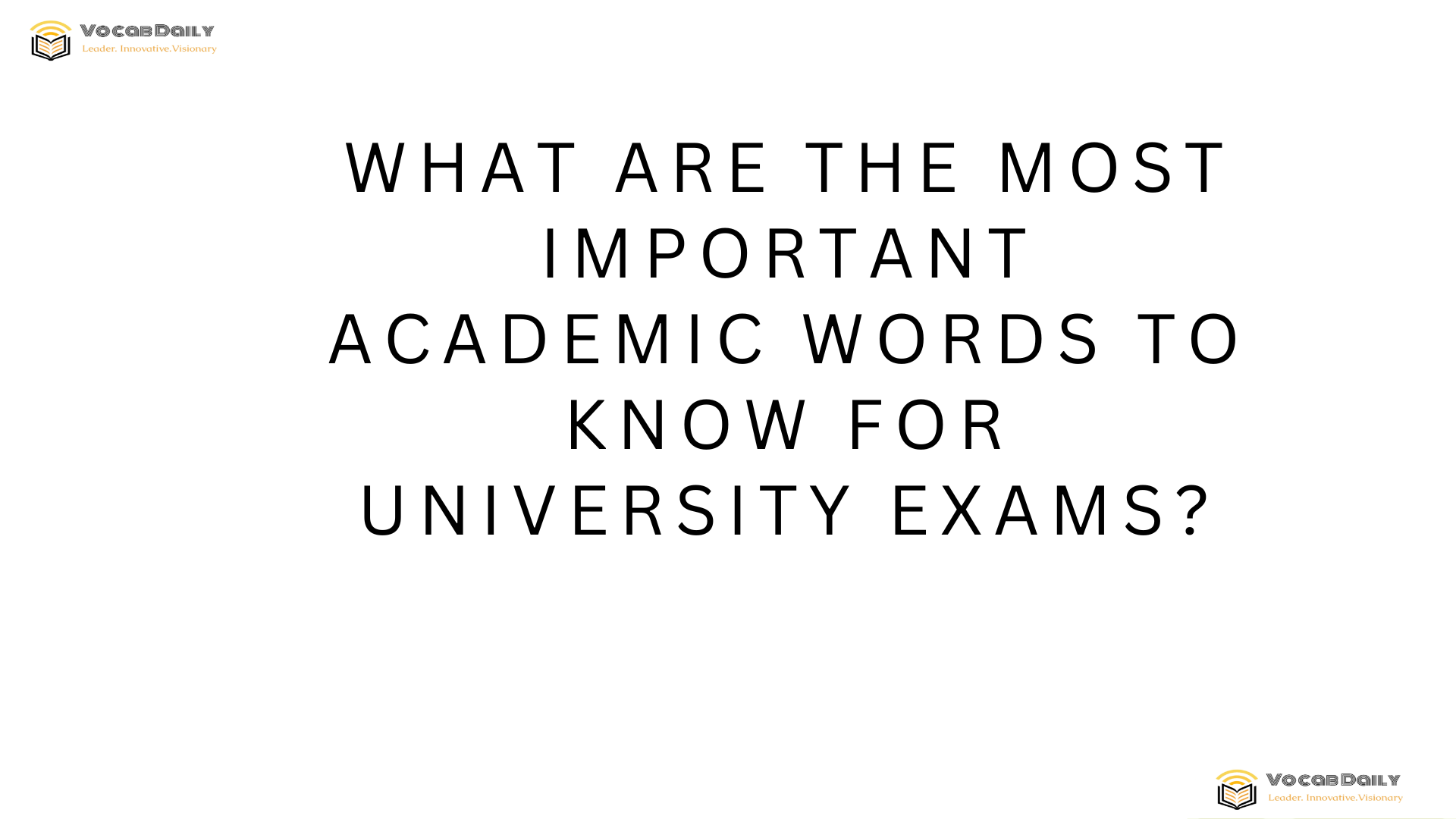The Importance of Academic Vocabulary in University Exams
Success in university exams is not just about memorizing facts or formulas; it also heavily relies on understanding the vocabulary specific to academic settings. Academic words form the foundation of comprehension in textbooks, exam questions, and essay prompts. They enable students to interpret complex ideas clearly and express their thoughts effectively. For students aiming to excel in their studies, building a strong academic vocabulary is essential.
Key Academic Words for Critical Thinking
Many university exams test students’ critical thinking abilities, expecting more than just rote learning. Becoming familiar with words that encourage analysis, evaluation, and synthesis can greatly improve responses. Some important academic words in this category include:
-
Analyze: to examine something in detail to understand it better or to identify important parts.
-
Evaluate: to judge or determine the significance, worth, or quality of something.
-
Compare: to identify similarities and differences between two or more elements.
-
Contrast: to highlight the differences between two or more things.
-
Justify: to provide reasons or evidence to support an argument or conclusion.
-
Interpret: to explain the meaning of something in your own words.
Mastering these words will help students not only understand what exam questions require but also construct more focused, coherent answers.
Academic Words for Writing and Argumentation
Writing essays and reports often constitutes a significant portion of university exams. Certain words commonly appear in essay prompts or marking criteria, guiding students to structure their arguments effectively:
-
Thesis: the main idea or argument of an essay.
-
Evidence: facts, data, or examples used to support a claim.
-
Argument: a reason or set of reasons given to persuade others on a particular point.
-
Claim: a statement that asserts something as true, often supported by evidence or argument.
-
Counterargument: an opposing point of view offered to refute or challenge the main argument.
-
Coherent: logical and consistent, making ideas easy to follow.
Using these words appropriately in essays or understanding them in exam questions can enhance students’ academic communication skills and overall performance.
Subject-Specific Academic Vocabulary
University exams often include subject-specific terminology that is crucial for demonstrating mastery in a particular area. While broad academic words are vital, students should also focus on vocabulary related to their field of study. For example:
-
In Sciences: hypothesize, variable, experiment, theory, data, observation, conclusion.
-
In Humanities: context, perspective, narrative, critique, era, ideology, source.
-
In Social Sciences: demographic, culture, phenomenon, policy, institution, trend.
-
In Business and Economics: market, strategy, revenue, investment, inflation, equity.
Familiarity with these terms not only helps in understanding exam questions but also equips students to write detailed answers with clarity and precision.
Transition Words to Improve Exam Writing
Coherence and flow are critical in written answers, especially in essay sections of university exams. Transition words help connect ideas logically and guide the reader through an argument smoothly. Some commonly used transition words include:
-
Additionally, Furthermore, Moreover: used to add information.
-
However, On the other hand, Conversely: used to introduce contrasting ideas.
-
Therefore, Thus, Consequently: used to show cause and effect.
-
For example, For instance: used to give examples.
-
In conclusion, To summarize, Overall: used to signal summary or conclusion.
Effective use of these words will ensure that answers are easy to read and ideas are presented clearly, which is often rewarded in grading.
Words to Understand Exam Instructions
Often overlooked yet critically important are the academic words found in exam instructions themselves. Knowing these words helps students fully grasp what is being asked, avoiding common mistakes such as answering too broadly or narrowly. Key instruction words include:
-
Define: provide a precise meaning of a term or concept.
-
Describe: give a detailed account with relevant characteristics or features.
-
Explain: make an idea clear by providing reasons or causes.
-
Discuss: give balanced consideration of different points of view.
-
Summarize: give a brief overview of main points.
-
Evaluate: assess the significance or value of something.
-
Illustrate: clarify by giving examples or evidence.
Understanding these instruction words ensures that students provide responses that match the exam requirements exactly.
Strategies for Learning Academic Vocabulary
Mastering academic vocabulary is not a one-time effort but a continuous process. Some effective strategies for learning these words include:
-
Reading Academic Texts: textbooks, journal articles, and scholarly essays expose students to words in context.
-
Using Flashcards: creating flashcards for new words and reviewing them regularly can reinforce memory.
-
Practice Using Words: writing practice essays or summaries using new vocabulary helps with retention and understanding.
-
Engage in Discussions: talking about academic topics with peers or tutors can improve comfort with vocabulary usage.
-
Utilize Vocabulary Apps: digital tools designed to build academic vocabulary make learning interactive and accessible.
Implementing these methods will gradually enhance a student’s confidence and proficiency with academic words, contributing to better exam results.
The Role of Academic Vocabulary in Long-Term Academic Success
Building a strong academic vocabulary does more than just improve exam performance; it fosters long-term success throughout university and beyond. Proficiency in academic words benefits students by:
-
Enabling efficient reading and comprehension of complex texts.
-
Facilitating the writing of clear, well-structured essays and reports.
-
Enhancing class participation and communication with professors and peers.
-
Preparing students for professional settings where academic language skills are valued.
In essence, investing time in learning academic vocabulary is an investment in one’s entire educational journey.
Also check out VocabDaily workbook collections.

Leave a Reply